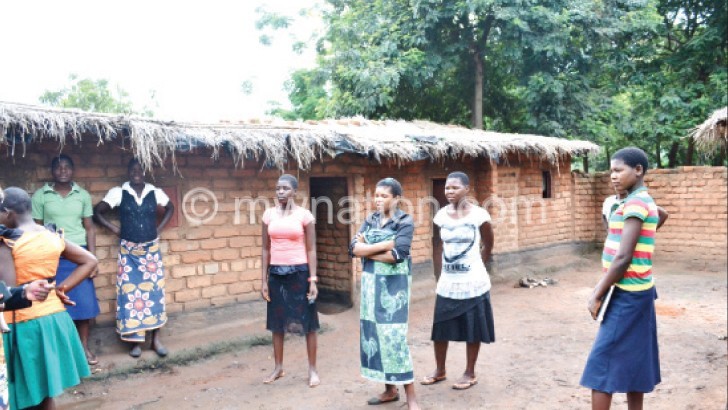Perils of self-boarding
In three years, over 119 girls at Sopa Community Day Secondary School in Mchinji dropped out due to teen pregnancies.
The majority of the adolescent mothers were renting houses in surrounding villages as the rural school had no boarding facilities.
The girls were escaping long walks to school when they ended in the free-for-all self-boarding setting.
According to head teacher Jonathan Magombo, some used to walk up to 30 kilometres to get to school.
“In the 2012-2013 academic year, 49 girls got pregnant, we lost 35 pregnancies the following year, 27 in 2015 and 28 last year,” he says.
The high attrition rate has pushed First Lady Gertrude Mutharika to construct a hostel at the rural school.
Form Three student Patience Dyetsani is one of the girls in the self-boarding arrangement.

Dyetsani is happy that the girls’ hostel under construction will save her generations from the shocking realities of self-boarding.
She reckons girls in unregulated accommodation facilities are frequently enticed and coerced into risky sexual relationships that push them to shun or quit school due to unintended pregnancies, unsafe abortions and sexually transmitted infections.
“We are frequently pestered by boys and married men looking for sex. Besides, the houses are leaky and our books frequently get soaked,” she narrates.
The learner believes the new hostel will save the girls from these men, including well-off adults, who take advantage of the girls’ poverty and lax security to lure them out of school.
The girls are constantly enticed into risky sexual transaction by money, groceries, gadgets and other freebies.
The story exposed by The Nation in October 2015 highlights the plight of girls as government seems indifferent to the hazards of self-boarding.
The intervention by the First Lady’s charity, Beautify Malawi (Beam) Trust, exemplifies official acceptance that something needs to be done to stop girls from going down the drain.
Beam trustee Dingiswayo Jere says the First Lady was touched with the revelations. She mobilised K42 million for the 200-bed hostel.
Construction started in January last year and the hostel is expected to be ready next month.
It is being built with the support of villagers, who eagerly contributed bricks, sand, water and artisans to ensure their daughters have a safe space.
Beam also offers needy schoolgirls bursaries covering tuition fees and basic amenities.
The head teacher is optimistic that the hostel will promote education attainment among girls.
“It was extremely difficult for school management to monitor the behaviour and conditions in self-boarding facilities. It is outside their jurisdiction,” says Magombo.
Having all girls in the new hostel will make it easier to monitor the situation, he says.
Beam is constructing hostels in six other schools across the country.
“Presently, we are overwhelmed by requests for girls’ boarding facilities. It is interesting that most of them have genuine cases of needs,” Jere explain.
Civil Society Education Coalition (Csec) executive director Benedicto Kondowe termed perils of self-boarding a nationwide crisis which is denying many girls a chance to remain in school and achieve their potential.
“There are many schools in a similar situation mostly because government is failing to provide an enabling learning environment and provision of necessary facilities in these schools,” the activist says.
According to Kondowe, it is high time government realised the importance of providing a favourable learning and teaching environment instead of “relaxing and exposing learners to risky situations”.
The future of many girls will continue being doomed unless government intervenes to correct the situation.
“The intervention of other stakeholders, like Beam, is satisfactory, but not good enough. Government needs to deal with the problem decisively, once and for all,” he says.
Lindiwe Chide, the spokesperson of Ministry of Education, Science and Technology, says government is building hostels for learners in some schools to lessen the challenges being faced by girls in community day secondary schools.
She says 15 hostels have been completed recently.
Government also offers bursaries to 25 000 students.
“Girls exceed 50 percent of the beneficiaries,” she says.
The self-boarding phenomenon constitutes one of the major shocks following the introduction of free primary education in 1994.
The scrapping of fees increased enrolment in primary schools while space in secondary schools was limited. This compelled government to convert distance education centres into secondary schools even though they lacked necessary facilities.
This was the genesis of problems faced by students at Sopa CDSS and other remote areas where secondary schools are few, constrained and far apart.
In the proximity of the magnificent hall taking shape in Mchinji, there is only one proper classroom block.
The rest of the classes are made of grass walls and roofs. They leak. They expose learners to distractions. They speak vividly of the long way the country has to surmount to ensure every child learns in decent conditions.





